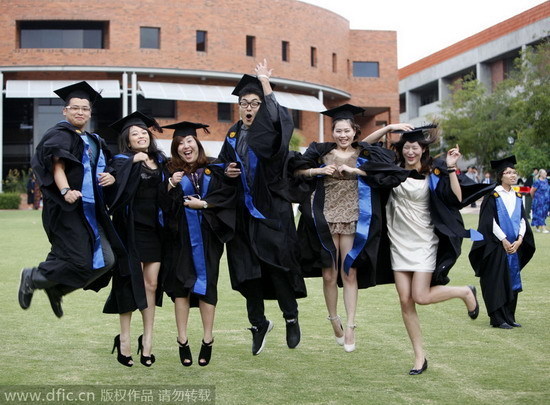 |
|
Chinese students pose for a photo at a graduation ceremony in Curtin University of Technology in Perth, Australia on Feb 11, 2012.[Photo/IC] |
In just 30 years studying abroad has become commonplace for Chinese
Yuan Pucheng was one of the very lucky ones. At the age of 27 the nurse was among just a handful her hospital chose to send to study in Japan - at the Chinese government's expense.
It was the early 1990s and Yuan was just one of hundreds of other medical personnel keen to realize a dream of broadening their professional experience in another country.
"At the time, even getting a recommendation to study overseas was difficult," says Yuan, who studied at a college that is part of Tokyo Medical University during 1992 and 1993.
"Almost all the people I know who studied overseas were recommended by some organization or other and studied at the government's expense. I was one of the lucky ones because I could speak a bit of Japanese. You had to do some very stringent training and pass a really tough test before you were given the nod."
Of the few Chinese who studied overseas in the 1980s and the early 1990s, almost all did so thanks to financial support from the government. That is hard to credit these days when you consider the international educational opportunities now available to Chinese. One of the beneficiaries of the great changes is Yuan's son, Sun Yuan.
After graduating from high school and scoring well in an English competence test, Sun enrolled at Monash University in Melbourne, Australia, in 2013. However, unlike his mother two decades earlier who had to rely on government funding, his family paid his way.
"I scored 7 in IELTS (the International English Language Testing System exam) and then started to prepare application material, including a score sheet of my senior high school. I had the necessary qualifications, so it was relatively easy to get offers from Australian universities," says Sun, 23, who opted for Monash over Sydney University and Queensland University and is now in his last year of a bachelor's degree in journalism.
Yuan marvels at how easy it was for her son to pursue his overseas ambitions compared with those of her generation.
"We are much better off financially than we were in those days, and when he attended middle school his English was good, so studying overseas was something he could do rather than going to a Chinese university.
"An agency helped him get the visa too. Young people these days definitely have more choices than we did."
Behind this greater freedom lie policy changes that have made China the largest source country for overseas students.
As the country started to open up and implement economic and social reform in 1978, it began to make it easier for more students to go overseas, where they could study in fields in which the country needed to catch up.
In August 1978 the Ministry of Education called for more undergraduate and graduate students to study overseas, a milestone that is regarded as the genesis of sending students to study overseas at the government's expense.
However, in reality traveling overseas at one's own expense was beyond most people's means.
